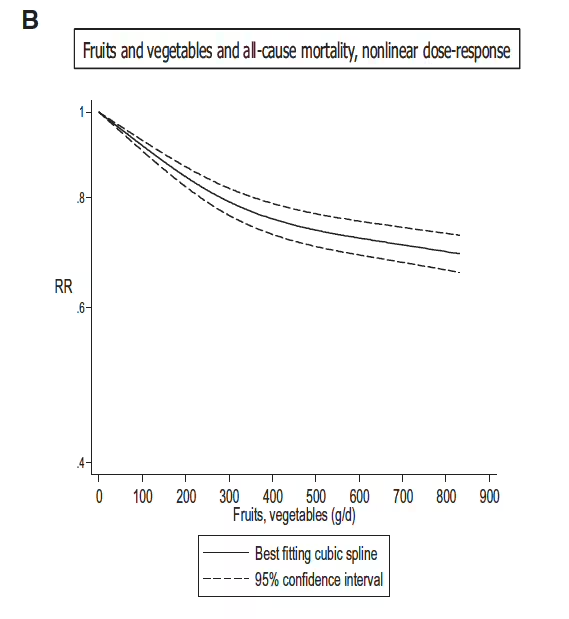The study
A few days ago a new study was published saying that “Eating more fruits and vegetables may prevent millions of premature deaths”. The media message was that we should eat “10 portions of fruit/veg per day”. But what did the paper really say, and how much is this “10-a-day” anyway?
What the study did was looking at a large number (92) of other studies on this topic. The study does not actually mention “10 portions”, instead they looked at fruit and veg intake up to 800g/day. This is twice the official UK recommendation of 400g/day, hence the “10-a-day”. For comparison, the US recommendation is “1.5–2.0 cups of fruit and 2–3 cups of vegetables daily”, and as a cup is 240ml, this is considerably more than 400g/day.
I have read the paper and I think this is a reliable study with a sound methodology. The main uncertainty I think comes from the fact that in the individual studies (what they call “cohort studies”), the amounts of fruit and vegetables consumed are self-reported by the participants using food-frequency questionnaires. This has been shown to lead to overestimating the consumption due to “social approval bias” (eating more fruit is good). It is not clear if the cohort studies corrected for this factor; in any case this would not change the observed trends.
What about the health benefits?
The paper shows that the relative risk of death from coronary heart disease, stroke and cancer is lower for people who eat more fruit and vegetables. As you can see from the figure below (Fig. 6 in the paper), eating 400g/day (“5-a-day”) already leads to a significantly lower risk.
To put this into perspective, the relative risk of death from coronary heart disease for men of age 40-44 due to smoking is 6.3. That means that smoking increases your risk by more than 6 times compared to not smoking. By comparison, eating 800g/day instead of 400g/day reduces your relative risk from 0.75 to 0.70 compared to eating no fruits or vegetables at all.

The key message of paper is that, assuming there is a causal link, then the percentage of deaths per year due to coronary heart disease, stroke and cancer that could have been avoided by eating 800g fruit/veg a day was 9%, whereas for 500g fruit/veg a day it was 6% (in the UK). So increasing intake from 500g/day to 800g/day would result in 3% fewer deaths, or 14,000 deaths prevented (total number of deaths from these causes was 315,000/year in the UK). The unknown factor is of course if the reduced risk is only because of the diet or if people who eat more fruit and vegetables have lower risks due to other causes as well.
Is 800g/day a lot or not?
A typical Quick & Tasty meal contains about 300g vegetables per person.
A piece of fruit (say an orange, apple or a banana) typically weighs 100-200g, so two pieces of fruit a day is on average 300g.
So eating 600g fruit and vegetables per day is actually very easy to achieve. If your other meals also contain some fruit or vegetables then even 800g/day is really not hard. So don’t be daunted by the “10-a-day’!
